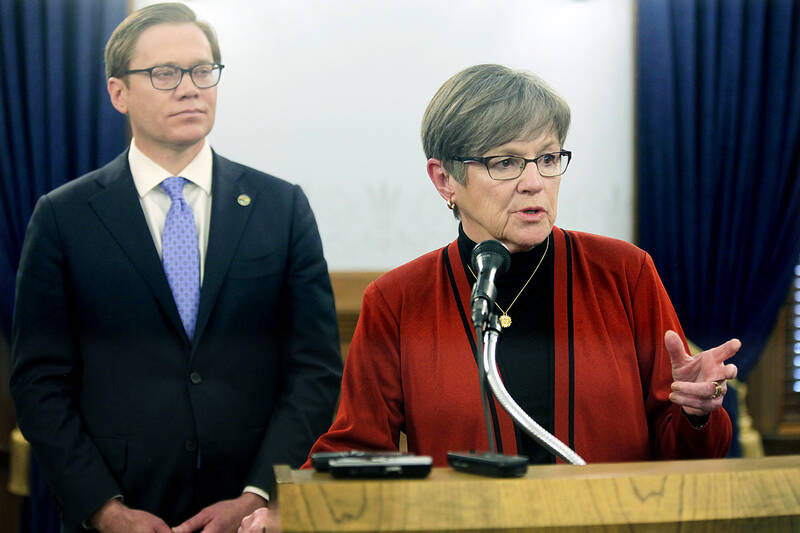Kansas plans to give US$304 million in taxpayer-funded incentives to a semiconductor company in its largest city to build a huge new factory, but the project would not go forward without funds the US government has promised to rebuild the nation’s chipmaking capacity.
Kansas Governor Laura Kelly on Thursday announced that the state has an agreement with Integra Technologies, based in Wichita, for a 10-year package of tax breaks and reimbursement of expenses. State officials said the new US$1.8 billion plant would cover 92,903m2, have 2,000 employees, and create 3,000 additional jobs among suppliers and other local businesses.
The announcement comes with the US trying to reverse a loss of capacity for making the chips that are vital to smartphones, laptops and other modern-day conveniences, as well as automobiles and life-saving medical devices.

Photo: AP
The US Congress last year approved a measure that provides more than US$52 billion in grants and other incentives for the semiconductor industry.
Kelly told reporters during a news conference that the state’s incentives are crucial to attracting the federal funds and “making Kansas an essential part of our country’s national security efforts.”
“This advanced manufacturing facility is part of a national push to restore our semiconductor industry so that US workers and businesses can compete and win in the race for the 21st century,” Kelly said.
Integra CEO Brett Robinson would not say how much federal funding the firm needs, only that there is “no commercially viable way” to do the project without it.
He and state officials said other states were trying to attract the project, though they did not disclose the competitors.
“It’s not just critical to the United States and to security, but it’s critical to the supply chain,” Kansas Senate President Ty Masterson said.
US President Joe Biden pushed Congress last year to boost the local semiconductor industry, because of a shortage of chips made worse by the global COVID-19 pandemic and concerns about competing with international rivals, particularly China. There has been a decades-long shift to cheaper-to-operate Asian chip plants, and the industry is now dependent on Taiwan.
“If we were ever to lose, for a sustainable amount of time, access to the southeast Asian supply chain, what we just went through would pale in comparison,” Robinson said.
Integra, founded in 1983, has about 500 employees in Wichita and Silicon Valley, and describes itself as the largest US provider of the last two major assembly and testing steps in the chip manufacturing process.
For the company to receive its incentives, it must invest at least US$1.5 billion in the new factory in the next five years and consistently provide the equivalent of 1,600 full-time jobs for 10 consecutive years.

To many, Tatu City on the outskirts of Nairobi looks like a success. The first city entirely built by a private company to be operational in east Africa, with about 25,000 people living and working there, it accounts for about two-thirds of all foreign investment in Kenya. Its low-tax status has attracted more than 100 businesses including Heineken, coffee brand Dormans, and the biggest call-center and cold-chain transport firms in the region. However, to some local politicians, Tatu City has looked more like a target for extortion. A parade of governors have demanded land worth millions of dollars in exchange

Hong Kong authorities ramped up sales of the local dollar as the greenback’s slide threatened the foreign-exchange peg. The Hong Kong Monetary Authority (HKMA) sold a record HK$60.5 billion (US$7.8 billion) of the city’s currency, according to an alert sent on its Bloomberg page yesterday in Asia, after it tested the upper end of its trading band. That added to the HK$56.1 billion of sales versus the greenback since Friday. The rapid intervention signals efforts from the city’s authorities to limit the local currency’s moves within its HK$7.75 to HK$7.85 per US dollar trading band. Heavy sales of the local dollar by

Taiwan Semiconductor Manufacturing Co’s (TSMC, 台積電) revenue jumped 48 percent last month, underscoring how electronics firms scrambled to acquire essential components before global tariffs took effect. The main chipmaker for Apple Inc and Nvidia Corp reported monthly sales of NT$349.6 billion (US$11.6 billion). That compares with the average analysts’ estimate for a 38 percent rise in second-quarter revenue. US President Donald Trump’s trade war is prompting economists to retool GDP forecasts worldwide, casting doubt over the outlook for everything from iPhone demand to computing and datacenter construction. However, TSMC — a barometer for global tech spending given its central role in the

An Indonesian animated movie is smashing regional box office records and could be set for wider success as it prepares to open beyond the Southeast Asian archipelago’s silver screens. Jumbo — a film based on the adventures of main character, Don, a large orphaned Indonesian boy facing bullying at school — last month became the highest-grossing Southeast Asian animated film, raking in more than US$8 million. Released at the end of March to coincide with the Eid holidays after the Islamic fasting month of Ramadan, the movie has hit 8 million ticket sales, the third-highest in Indonesian cinema history, Film